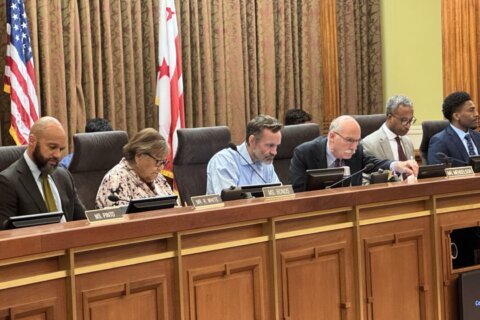An attorney for Beltway sniper Lee Boyd Malvo told Maryland’s highest court that a Montgomery County judge failed to properly consider Malvo’s youth during sentencing, and asked the Court of Appeals to order Malvo be resentenced.
In 2006, Montgomery County Circuit Court Judge James Ryan sentenced Malvo to six life sentences without the possibility of parole for his Maryland crimes, after Malvo pleaded guilty for his role in the killing of six strangers in Montgomery County in October 2002.
In total, Malvo and John Allen Muhammad killed 10 people, and wounded three in Maryland, Virginia and the District of Columbia. Muhammad was executed in Virginia in 2009.
In Tuesday’s oral arguments, Malvo’s lawyer said his punishment violates the 2012 U.S. Supreme Court ruling barring mandatory life sentences without parole for juvenile offenders.
The 2012 U.S. Supreme Court Miller v. Alabama ruling stated life sentences for defendants 17 and younger should be barred “for all but the rarest of juvenile offenders, those whose crimes reflect permanent incorrigibility.”
Malvo was 17 at the time of the rampage.
The victims in Montgomery County were James Martin, James Buchanan, Premkumar Walekar, Sarah Ramos, Lori Ann Lewis-Rivera, and Conrad Johnson.
During Tuesday’s oral arguments, conducted by video, Malvo’s attorney, Kiran Iyer, with the Office of the Public Defender, said Judge Ryan’s didn’t fully consider his client’s youth.
“To be clear, we’re not suggesting Judge Ryan did not know that Malvo was 17 years old at the time of these offenses,” said Iyer. “There’s no discussion of Malvo’s immaturity, and the diminished culpability of juvenile offenders, which of course is the central thrust of Miller, the central fact that must be considered in sentencing.”
As part of his plea, Malvo testified against Muhammad in the older sniper’s Montgomery County murder cases.
Quoting Ryan from the sentencing transcript, Iyer said, “The community does not forgive these offenses.”
“I think that makes it clear that the basis of this decision was retribution, not incorrigibility, not a belief that Malvo was incapable of being rehabilitated,” Iyer said.
Additionally, last year Maryland’s General Assembly abolished life sentences without parole for juveniles, overriding a veto by Gov. Larry Hogan. Virginia passed a similar law.
Maryland’s Juvenile Restoration Act, or JUVRA, states that people who have served at least 20 years of a sentence for a crime committed when they were under the age of 18 can file a motion asking the circuit court to reduce their sentence. The Maryland law, which is similar to Virginia’s, took effect, Oct. 1, 2021.
During Tuesday’s oral argument, assistant attorney general Carrie Williams, representing the state, said Malvo’s Maryland sentence doesn’t violate the U.S. Constitution’s 8th amendment against cruel and unusual punishment, and that he will be able to seek modification of his sentence after 20 years.
Williams and the judges acknowledged courts have not determined how JUVRA should be applied in cases where a juvenile is convicted of serious crimes in different states.
“If Mr. Malvo’s sentences are considered in the aggregate, not only his six life sentences without parole in Maryland, but also his four life sentences in Virginia, he will have to serve 140 years before he is actually capable of walking out of prison,” Williams said. “So, critical to this case is whether this case finds Mr. Malvo’s sentences should be considered as one single sentence, in the aggregate, or separate, stacked sentences.
In Virginia, Malvo received four life sentences without the possibility of parole, after being convicted of two counts of capital murder in the killing of Linda Franklin, in Fairfax County, and pleading guilty to shootings in Spotsylvania County that involved the murder of Kenneth Bridges and the wounding of Caroline Seawell.
After the 2012 U.S. Supreme Court Miller v. Alabama ruling, Malvo’s attorneys in Virginia successfully argued for a new sentencing.
In October 2019, Malvo’s lawyers argued before the U.S. Supreme Court that he should be resentenced for his Virginia crimes.
However, after Virginia Gov. Ralph Northam signed the law banning life sentences without the possibility of parole, Virginia’s solicitor general and Malvo’s lawyer asked the nation’s highest court to dismiss the case, since the life-without-parole sentence no longer exists. In February 2020, the U.S. Supreme Court dismissed the Malvo case.
Since Malvo has been in custody since 2002, theoretically he could be considered for review this year. Prosecutors in Virginia and Maryland, as well as Malvo’s attorney have said given the gravity of his crimes, the possibility of his ever being granted parole is virtually nonexistent.








